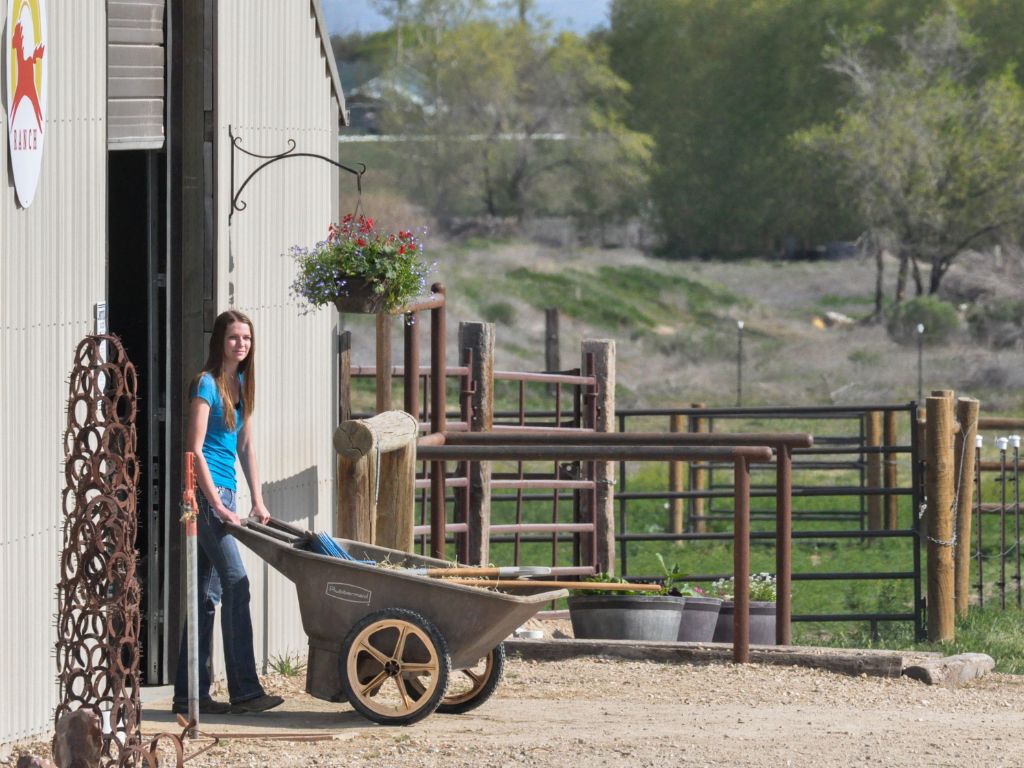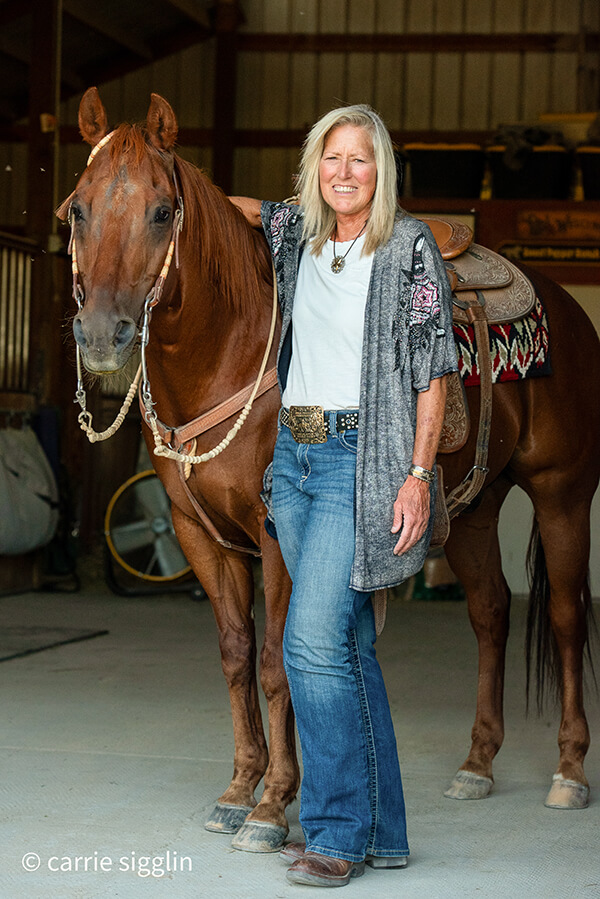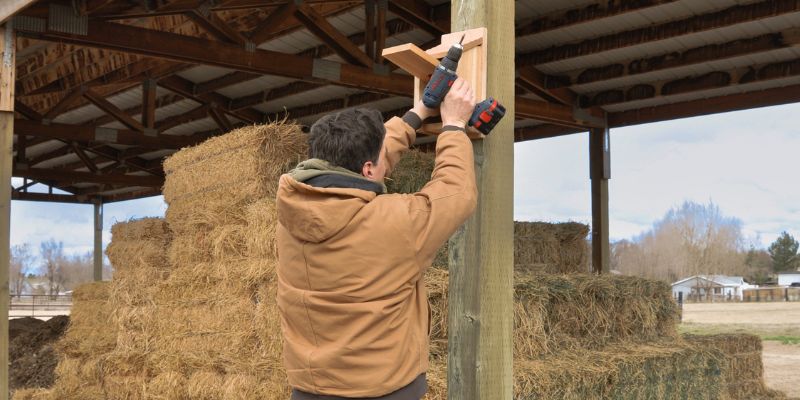Get Ready for the Busy Season Ahead!
Earth Day is just around the corner on Saturday, April 20, 2023. In some parts of the country, daffodils are poking their heads up and may even be blooming. That means now is the time to get things done around your horse property so you will be ready for the upcoming growing season. Here are a few suggestions to get you started.
Get your violet-green swallow boxes (and other nest boxes) ready!
In the Pacific Northwest we love our violet-greens. They are beautiful, fun to watch, and voracious insect eaters, eating about 4,000 insects per day per bird! Mid-March is when these faithful insect controllers begin returning from Central America to North America and start house shopping.
Swallows eat flying insects and there’s a species native to just about every corner of North America. Many are secondary cavity-dwellers, requiring a hole built by someone else as a nesting spot. Clean out last year’s nest boxes by simply opening the trap door and cleaning out the contents. If you don’t have any nest boxes hung yet, now’s the time to do it, that way violet-greens and their cousins will want to spend their spring and summer hunting insects on your farm.
Remember: You must use nest boxes designed for your specific bird. Horses for Clean Water has a tip sheet, The Swallows Are Coming, with directions and nest box plans, that you can find on the website, horsesforcleanwater.com. Or check out The Original Birdhouse Book, by Don McNeil.
Add compost to gardens. The manure and stall waste that you have been composting over the winter should be just about ready to rototill into your garden or share with your neighborhood gardening friends. Your compost may need to be turned or have aeration pipes put into it to help finish it off before you spread or move it to your garden. Compost is an excellent soil amendment that adds organic material, important microbial life, and micro-nutrients to gardens and pastures.
Tune-up your manure spreader. Look at your manure/compost spreader to see if it needs any tune-up work done. You may need to oil or grease a few parts before putting it into action. The drive mechanism or beater bar gears can often use some attention. Check the air in the tires and see if you need to grease the bearings or PTO shaft and couplings. It’s always good to check these things out ahead of when you’re ready to start spreading. It’s no fun spending half the day fixing things before starting the real work (speaking from experience)!
Tune-up your tractor. Even if you have been using your tractor all winter, it’s still a good idea to give it the once-over at the beginning of the growing/mowing/spreading season. Even if your “tractor” is only a riding lawn mower it will still need some annual maintenance such as an oil change, checking/changing the fuel and air filters, greasing all the fittings, and checking the tires. While you’re inspecting the tractor also look at your mower deck and any other implements you use on your property. Taking care of these things now is a good idea so you don’t end up stopping to fix something when you’ve just started mowing or spreading.

Do a soil test. Spring is a good time to do a soil test before you spread any fertilizer and/or lime, especially if you haven’t done a soil test in a while. A soil test will tell you exactly what your grass plants and soil need in the way of nutrients.
It’s like checking the oil dipstick in a car; if you don’t check the level first you could be doing more damage than good. If you go ahead and add fertilizer, you may or may not need it. If your soil doesn’t need it, it will simply wash away with the next rain, possibly contaminating ground or surface water. (However, if you prefer to waste your money, then just send me the cash you’d be spending on the fertilizer and save yourself the trouble of buying and spreading it.)
A soil test is a cheap way to find out just what your soil and plants need—and a soil test usually only costs around $25 to $35. Contact your local conservation district or extension office for a soil test kit or for information on how to get one.
Walk fence lines. Depending on the layout of your property, you’re probably not able to see all the fencing from one location. And if you’ve been keeping your animals off the pastures for the winter, chances are you may not have taken a good look at things in the pasture for a while. Now is a great time to do a close inspection of your entire fence line. Weeds, tree branches (or the entire tree, for that matter), wildlife (a.k.a. elk and deer) may have taken a toll on fencing during the winter months.
Before you begin using pastures (once soils are no longer soggy and wet) take a walk along the fence lines to see what repairs or clean-up are needed. You’ll be glad you did it now instead of waiting for your neighbor to bring back your horse after it tore through his newly planted garden. Don’t forget to test the hot wire to be sure it’s still working too.
Check pastures for weeds and bare spots. While you’re out in your pastures, take a little time to look for weeds that may be creeping in. Weeds often green up before grass plants so it should be easy to spot them and it’s easier to attack young weeds. This is also a good time to look for bare spots and spread grass seed before weeds move in. For questions or help with this topic, contact Horses for Clean Water, your local conservation district, or the nearest extension office.
See this article in the March/April 2023 online edition:
March/April 2023

Alayne Blickle began in the 1990’s as a pioneer in water conservation and natural resources conservation by creating the entrepreneurial consulting business, Horses for Clean Water, an award-winning internationally acclaimed education program that looks for horse-healthy, nature-based solutions to land management challenges. She continues this work today partnering with agencies, organizations, and horse owners throughout North America and worldwide. She is a regularly contributing writer and photojournalist to several equine publications.
Alayne lives with her horse trainer husband, Matt Livengood, in southwestern Idaho where they raise and train AQHA horses and mustangs on their eco-friendly horse ranch. Contact her through the Horses for Clean Water website or through their ranch website Sweet Pepper Ranch.
For more information contact Alayne at [email protected] or 206-909-0225.






